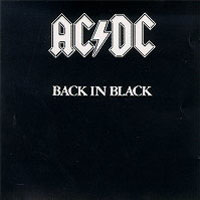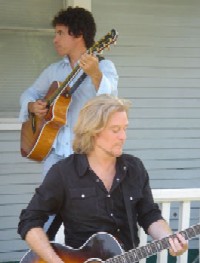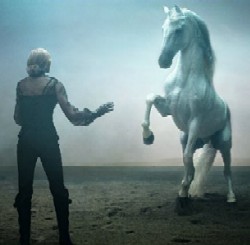It had been a long while (well, only a mere two months, but for a music freak, that’s an eternity) since I had seen a live show. And I suppose this desire, along with the recent discovery that you could escape exorbitant Ticketmaster charges (i.e., $10 for a $20 show!) at the Fillmore by buying tickets directly from the box office, led me to select Nada Surf (opening acts: Inara George and Rogue Wave) as the band to get back into the game with. Agent Tito Perez, who I later learned wasn’t really a fan for bands serving that halfway point between party band and indie pop, was kind enough to accompany me. But as it turned out, Mr. Perez’s wisdom on this point far exceeded mine. And we were both duped as a result of my ill-fated excitement.
Nada Surf, as a live experience, turns out to be a band that has little to offer to anyone over the age of 24. Their lyrics come across as more puerile in person (or perhaps reveal themselves as such). Their stage presence is hackeneyed and culled from strange sources. Bassist Daniel Lorca, for example, regularly smokes cigarettes, shooting out great plumes while playing as if this gleeful self-immolation is some kind of musical innovation. But in lieu of Slash’s wild hair or soulful guitar solos, we get a dreadlocked idiot bouncing up and down without élan, much less a point, while offering straightforward bass lines while muttering asides like, “Fillmore! Fuck yeah,” and without, say, the admirable goofiness of bald Rogue Wave bassist Evan Farrell, whose spastic stage presence was easily the highlight of a mostly mediocre evening, but only when compared with the lifeless performances of his compadres. Their vocalist/guitarist, Matthew Caws, is an adenoidal adolescent long overdue for an elocution class, much less a lesson in subtlety.
I could offer sad excuses, such as the fact that I have a weakness for arpeggio-based bands and the fact that, even now in my early thirties, I am still trying to prolong certain immature impulses, which may explain the whole halfway “party band” thing I am still coming to terms with. But I must thank Nada Surf for delivering an austere lesson: A party band is a party band is a party band. I walked away from the show feeling nothing more than the paper-thin razzle-dazzle that one easily outgrows. The hollow dupe of hubris-laden vocalists and, most criminally, a sound engineer who boosted up vocals with excessive treble that agitated my ears, as if I was being bombarded with an array of unwanted whispers, and, most unpardonably, the shameful sham of reverb for tunes that, to my ear at least, did not require much of a larynx stretch. Unless, of course, the live limbo bar has been raised to a rather comfortable two-octave range.
A few words about the Fillmore, which may further explain the Nada Surf decision. It’s a good venue. Nearly every music freak knows its history, but it’s also the place where strange things always seem to happen for me. The band that once told the audience that, “If you want to hang out with us, we’ll be out front.” Not just once, but repeatedly. In between each song. As if the prospect of hanging “out front” would somehow allow one to parse this band’s allure. Or, as I later observed that evening when I went “out front” (not, I assure you, to hang out with this band but to relieve myself), scantily clad and underaged girls throwing themselves at the frontman. The band that once screamed to the crowd, “We’re from Walnut Creek! And we’re angry!” (Indeed.) There was also the incident about a year ago of the attractive blonde, seven years my junior and surprisingly sober, who once groped me while simultaneously trying to get me to dance, apparently smitten with my T-shirt, which had an obscure cultural reference on it, and what she referred to as my “amazing brain.” I found this somewhat sad and yet the perverse side of me couldn’t resist its sordid appeal.
And, as I shall soon relay further, Thursday night likewise possessed a seamy undercurrent that more than made up for Nada Surf’s deficiencies.
But before I get to Nada Surf, let me talk of the two bands that preceded them.
We arrived as a woman named Inara George sang songs, accompanied by a keyboardist who did not move, much less perform, and a moribund guitarist, both of whom I felt very sorry for. Her tunes were wholly undistinguishable from each other, much less an open mike night at a coffeehouse. This was a singer who had clearly spent many years in a bedroom impersonating Bjork, Dolores O’Riordan and Laetitia Sadier, and had failed to come up with a distinct voice of her own. As I said to Mr. Perez, “This chick gives chick pop a bad name.” Her lyrics were immediately suspect because she seemed to be under the false impression that the words “fashion” and “reaction” rhymed. Further, in between songs, Ms. George kept insisting to the audience that she was not drunk. Drawing attention to one’s weaknesses to a lukewarm audience is, in my view, a pretty suicidal move. But that wasn’t the least of Ms. George’s self-sabotage. She then proceeded to crack a lame joke about Paris Hilton, which received no laughs. She then said, “If Paris Hilton is in the crowd tonight, I’m sorry. I think she’s pretty cool.” Oscar Wilde, Ms. George clearly is not.
If there was a positive during during Ms. George’s peformance, Mr. Perez and I made known our secret appreciation for Joanna Newsom (who may actually be related to Mayor Gavin), who has seemingly disappeared from the face of the earth after the excellent album, “The Milk-Eyed Mender.”
Sometime around Ms. George’s performance, I had the first of two whiskey sours, in large part because the high audience contingent of youths ten years my junior was making me feel like an old lady and I figured I should imbibe along these lines.
Thankfully, Ms. George concluded her interminable set. Rogue Wave then appeared. Rogue Wave hails from the East Bay and I had been intending to see them. I can recommend their album, “Out of the Shadow.” The live Rogue Wave is, with the exception of the aforementioned bassist Evan Farrell, fairly lifeless. Vocalist Zach Rogue hides like a coward behind the smooth polish of overdone reverb. It’s a shame, because he doesn’t have that bad of a voice. The backup guitarist and the drummer frequently switch positions, but, outside of Farrell, this is the only real animation that you are likely to encounter from this band. Apparently, Rogue and company didn’t get the memo that the shoegazing thing died out around 1993.
I am not certain if Mr. Farrell might find a way to urge his fellow bandmates to amp themselves up. He had, as Mr. Perez observed, good clapping moves. And any bald musician contorting his body like a fey fish deserves many plaudits from this cultural chornicler.
Unfortunately, Farrell also had to play bass. And his moves were naturally occluded by this and the telling awareness that his fellow bandmates were tragically inert.
Perhaps the solution here is some mad roadie running around on stage threatening to electrocute Rogue Wave’s remaining members if they refuse to move. In fact, this might be a dependable approach used across the board to break bands out of the dreadful habit of staying in place. If you’re going to perform, then, dammit, perform!
We now come to Nada Surf, of which I have very little to add. They did have an intriguing stage setup which I thought might factor into the show. Five round mirrors were placed behind the band, as if to suggest some conceptual angle that would play out later in the show. Alas, it was little more than a literal reference to “In the Mirror,” a track off their album, The Weight is a Gift.
For their first two songs, Nada Surf started off with a nice sound. Rich guitar, vocals balanced, and of course the aforementioned stage animation from Lorca, which offered great relief to the rectilinear antics of Rogue Wave. But after the second song, Caws raced over to the sound guy and the band made a tragic mistake. Suddenly, Caws’ vocals dwarfed the entirety of the mix. This was unfortunate, because Caws was riding high on reverb and it soon became apparent how childish his lyrics were (“I want you lazy science / I want some peace / Are you the future? / Show me the keys”) and how deficient his vocal timbre was.
“Concrete Bed,” in particular, suffered from the mid-set remix. The song, for those of you who have heard the album, relies on a very catchy guitar hook to drive the song forward. For whatever reason, when the sound guy was asked to change levels, it came at the expense of the levels on Caws’ guitar. And without the jangly rhthym guitar, the song felt as if it was missing something.
Was this a vocalist’s arrogance or a case where Nada Surf’s monitors were malfunctioning, simply not reflecting the mix the audience was hearing? I didn’t see it, but Mr. Perez observed the drummer pointing upwards as Caws was negotiating with the sound guy.
But the end result was that I came away not really wanting to listen to Nada Surf anymore, feeling very much an adult surrounded by children. Because the secret to their success (careful production in the studio) had been exposed, revealing a band that was utterly anemic in person. There are some bands that are like this, unfortunately. Which begs the question: If you’re unwilling to expose your band’s vulnerabilities on stage, why tour at all? Mistakes are one of the reasons people go to see live shows. I hereby declare a moratorium on the use of excessive reverb in live shows.
While my interest in Nada Surf’s live act flagged considerably by the fifth song, I did espy a very creepy situation going down on my left. Apparently, a man, who was somewhere between the age of fifty and fifty-five, was trying desperately to talk with someone who appeared to be an eighteen year-old girl. The girl was with two other friends. And I thought at first that this man was escorting his daughter to a live show. He seemed quick to prove that he was enjoying himself by bobbing his head up and down and shaking his body. But it soon became apparent by the girl’s body language (frown on face, trying to avoiding this man’s repeated efforts to chat her up) that she was uncomfortable and that she didn’t know this guy. It wasn’t a case of mere avoidance. It was a case of this girl not really having any other place to shift to on a crowded floor.
Then the girl’s two friends disappeared. And I watched the girl repeatedly brush her hair with her hand as the man held up first three fingers and then five fingers. He then pulled out his wallet and returned it back to his pocket. Was this a proposition? It certainly looked like it. Could it be that older men attend the shows at the Fillmore with the express purpose of picking up young women? If so, I’m sure this wasn’t a first. This unsettled me. But before I could find out a definitive answer, the show was over.
 3. What Do You Do for Money Honey — Johnson finally finds his groove and the band boosts up his presence with the grand chorus crescendo. The verses and the subdued guitar here allow Johnson to screech with gusto. And it’s clear that a mere three songs into Back in Black, he’s at long last come into his own.
3. What Do You Do for Money Honey — Johnson finally finds his groove and the band boosts up his presence with the grand chorus crescendo. The verses and the subdued guitar here allow Johnson to screech with gusto. And it’s clear that a mere three songs into Back in Black, he’s at long last come into his own. So I avoid the cultural headlines for twelve hours, scratch my head over why people are suddenly quoting Syd Barrett lyrics, and learn that
So I avoid the cultural headlines for twelve hours, scratch my head over why people are suddenly quoting Syd Barrett lyrics, and learn that  If you are of a certain age, you will recall that, a few decades ago,
If you are of a certain age, you will recall that, a few decades ago,  I can say this because
I can say this because